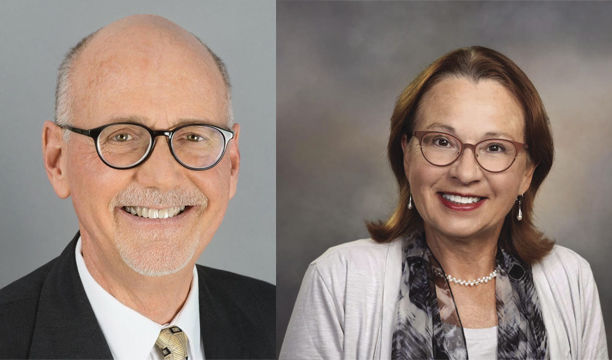- App Content
- App Content / News
- News
- News / Politics And Administration
- News / Politics And Administration / City
Ames mayoral candidates answer questions regarding platform
November 3, 2017
At a candidates open forum, mayoral candidates, John Haila and Victoria Szopinski, answered questions from city climate to relationship between the city and Iowa State University.
With election day coming up Tuesday, here are some of the questions they answered.
How do plan to move Ames forward?
Szopinski: There’s a growing body of research … about how cities are changing, communities are changing in the manner in which they are able to bring business, retain business, retain populations, bring in residents and that is through amenities. We have a really great city and we have the opportunity to have even more amenities, a healthy life center, we’re looking at complete streets which makes this community open to being a healthier place to live. I like for us to revisit the building of a conference convention center which I think is, we know we are losing business and that we need to have that happen here in Ames. But all of these are what is going to help move us forward to make us more attractive and to retain what we have.
Haila: We need to work together as a community. We need to start listening and understanding or continue listening and understanding one another … Secondly is collaborating with Iowa State, the county, school leadership. I understand years ago, they used to have quarterly meetings. I propose we reinstitute that to foster good communication.
What ways would you want to improve the relationships between the university and the city?
Haila: [The question] is implying that there’s actually some problems potentially and I don’t think there is … However, I get really excited about relationships and the new president coming is going to be very, very important. The city of Ames and university are intertwined and dependent upon one another that they’re both successful. And about relationships, for 30 years in owning a business, I’ve built relationships with people. [They’re] about listening and collaborating.
Szopinski: We have a strong history of collaboration with the university and we need to make new leadership aware of both the importance to both the city and university. This is something to brag about. The same would be true for the school district’s administration and new leadership on the school board. We need to be working together to form strong relationships with these institutions, but I also believe these relationships need to employ all members from our institutions.
How do you plan to alleviate feelings of alienation among Ames residents?
Szopinski: Questions to do with, or asking about race, are probably the most complicated questions and sometimes we fear that we are going to say the wrong thing even when we are trying to say the right thing. I have been around for a long time, I have lived in a lot of different places, personally I have tried very hard, I personally want to facilitate better relations. I can not make individuals necessarily behave better but I can certainly strive to gather other individuals and other groups who I know are eager to do better. Implicit bias training, which was held in [the Ames Public Library], a few months ago was a wonderful eye opener and I encourage everyone, if you have the opportunity, to do that type of training because even when you think you are doing well, there is just things that [are] subconscious and it is ingrained from our various lives. Or at least I can speak for myself– I cannot speak for everybody– for my life. But one example that I will use and you know it is not a surprise to anybody, I am one of the founding members of the Ames Progressive Alliance and I am very proud that as one small part of this community after one too many black men were shot in this country, we decided we needed to do something and be a little more proactive. So we went to one of the predominantly black churches here in town, the Body of Christ Church, the police department came, we got together, we had small group discussions, those discussions are still ongoing, and I think that is a start.
Haila: I believe that starts with each of us individually reaching out and building relationships with individuals. It is not just a matter of saying ‘someone else should do it,’ it is actually us personally reaching out across the aisle, across the street, whatever, and just saying “I want to get to know you.” How can we really understand anybody if we don’t really know them, and that’s what’s important. So I am committed to establishing and building relationships with people from all different walks of life. People of color, any different, sorry– Secondly is, in terms of getting them to stay in the community, is are there jobs, that there are businesses that are being intentional about trying to engage people of color to come in and work. I know in our own business, we have a variety of people from different walks of life, and that has been very enriching and a very positive situation. So i say personally, and also the other thing is just by engaging people in conversation as a mayor, to understand how we can better break down those barriers…
















